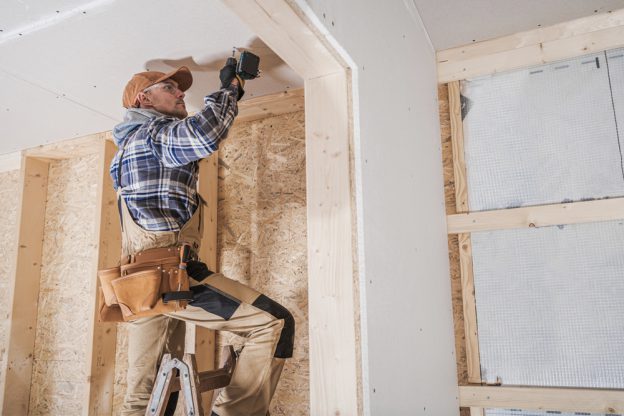We say Happy New Year to all acting and hopeful California contractors! It’s important – as always – to take a closer look at changes to the law for California contractors in the coming year.
The Contractor State License Board (CSLB) just released a press release outlining the most important pieces of legislation for contractors. There are some big ones this year – so let’s make sure you’re prepared to stay compliant in 2024.
First, we’ll provide the Contractor State License Board’s (CSLB) missive to all contractors, and then we’ll provide a little breakdown of what the text actually means for contractors in the coming year. Let’s check it out!
Sacramento, CA – Heading into 2024, the Contractors State License Board wants to remind licensees of new laws taking effect in the new year.
SB 630 (Dodd)
This bill requires CSLB licensees and applicants to provide an email address, if available, when they obtain and renew licenses. The email addresses are not subject to disclosure under the California Public Records Act. This bill also authorizes the Registrar to automatically reimpose license revocation when probationary conditions placed on a license are not met. (Chapter 153, Statutes of 2023)AB 336 (Cervantes)
This bill requires licensees with a workers’ compensation policy to provide the top three workers’ compensation classification codes on their workers’ compensation policy when they renew their licenses. Those codes will be posted on the CSLB license lookup webpage. Licenses won’t be renewed without the codes. However, the bill allows for retroactive renewal if the licensee provides the codes within 30 days after receiving notice of the denial. (Chapter 323, Statutes of 2023)AB 1204 (Holden)
This bill prohibits specialty contractors from subcontracting with two or more contractors in the same classification on the same jobsite unless the subcontractor has employees who perform the work in the relevant classification or are party to a collective bargaining agreement. This bill makes violations of this section cause for disciplinary action. (Chapter 568, Statutes of 2023)SB 601 (McGuire)
This bill increases the statute of limitations to three years for misdemeanor violations by a licensed contractor for allowing an unlicensed person to use their contractor license. This bill also requires courts to assess the maximum civil penalty for specified home improvement contract violations in declared disaster areas. (Chapter 403, Statutes of 2023)”
SB 630: Contractors’ Email Addresses
SB 630 (Dodd) specifically requires that applicants, registrants, or licensees who possess a valid email address must provide this email to the board at the time of application or renewal. In safeguarding the privacy of individuals involved, the bill stipulates that these email addresses are not subject to disclosure under the California Public Records Act or other similar laws, except in specific circumstances mandated by a court order.
Additionally, SB 630 changes probationary conditions for contractors who have violated the law. It allows for a stay of execution of disciplinary decisions, contingent on the completion of specified probation terms and conditions. Crucially, if these terms and conditions are not fully complied with, it can result in the automatic termination of the stay of execution, thus reinforcing the accountability of licensees under disciplinary action.
The bill also includes provisions for the payment of restitution and the costs of investigation, enrollment in specific coursework, and successful completion of relevant examinations as part of the probationary conditions.
AB 336: Workers’ Compensation Requirements
AB 336 (Cervantes) sounds complicated but it isn’t. It requires any contractor who has Workers’ Compensation to provide to the CSLB three classification codes that are on their insurance policy.
Specifically, contractors need to identify the three classification codes for which the highest estimated payroll is reported on the policy. If there are fewer than three classification codes reported, all the reported codes must be provided.
This bill mandates that the Contractors State License Board (CSLB) include these classification codes in the public license detail on its website when updating for an active renewal. However, the CSLB is not required to verify the accuracy of these codes and is not liable for any misreported classification codes by a licensee.
In essence, AB 336 aims to improve transparency and accountability in the realm of workers’ compensation insurance among contractors. It ensures that the relevant classification codes are readily available and accessible, contributing to better regulatory practices in the industry
AB 1204: Multiple Class C Contractors
AB 1204 (Holden) relates to specific Class C specialty contractors who are prohibited from entering into contracts for work on the same project or undertaking with more than one subcontractor in the same license classification.
- This restriction is subject to two key exceptions:
The subcontractor employs persons who are classified as employees to perform work in that license classification on the project. - The specialty contractor is a signatory to a bona fide collective bargaining agreement covering the type of work performed on the project and addressing the issue of subcontracting or subletting.
SB 601: A Litany Of Changes
SB 601 (McGuire) makes several important changes to contract law for contractors, specifically aiming at preventing fraud, especially in disaster areas. It covers a few specific areas: home improvement contracts, liens, provisions for bonds, criminal penalties for violations, and restitution for fraud. In greater detail, SB 601 makes changes to:
- Home Improvement Contracts Requirements: The bill outlines the specific things that are required to be in home improvement contractors. This includes stipulations about the contract being in writing, the inclusion of the full contract amount, separation of finance charges, limitations on down payments, and specific schedules of payments.
- Payment and Lien Release: Except for a down payment, contractors should not request or accept payment exceeding the value of work performed or material delivered. It also requires contractors to furnish a full and unconditional release from any potential lien claimant for any part of the work for which payment has been made – but only if requested by the client.
- Provisions for Contractors with Bonds: Contractors furnishing certain types of bonds or joint control approved by the registrar are exempt from some of these requirements and may accept payment before completion of work.
- Criminal Penalties: The bill outlines the specific misdemeanor charges for violations of these provisions, with increased fines in areas damaged by natural disasters. Furthermore, it specifies a statute of limitations for bringing actions against licensed and unlicensed contractors.
- Restitution for Fraud in Disaster Areas: In cases of fraud related to natural disaster repairs, the bill mandates full restitution to the victim based on the defendant’s ability to pay, along with potential additional fines.
- Operative Date: The section concerning home improvement contracts becomes operative on July 1, 2024.
Remember – staying compliant is nobody’s job but yours. Do your diligence and make sure that you’re constantly on top of things, and you’ve got nothing to worry about from Johnny Law!


